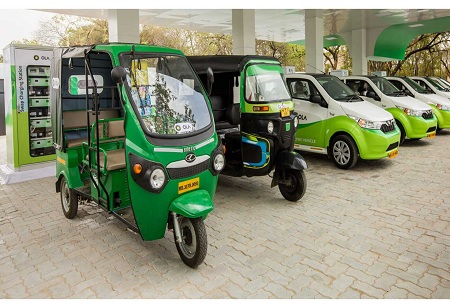Global warming has become a serious issue that needs to be addressed. In order to deal with it, many government policies have come into force to reduce pollution created by vehicles. However, even after this move, the pollution created by vehicles is still tremendous. With the introduction of
electric vehicles, a viable option has been created and the market for electric vehicles has seen a steady growth in the recent times.
In the electric vehicles section,
three wheelers have emerged as bestsellers in Delhi. Since the launch of the Delhi EV policy in August last year, 5,534 new EV three-wheelers have been registered and more users are showing interest. Subsidies under the Delhi EV policy on electric three-wheelers reduce the total cost of its ownership by up to 26% and by switching to one an individual buyer can save up to Rs 29,000 per year. Similarly, subsidies for e-rickshaws reduce the total cost of ownership by up to 33%. Under the policy, 177 three-wheeler models are available and eligible for purchase, along with scrapping incentives across 68 manufacturers.
Let us take a look at the Electric vehicles industry with focus on the three-wheeler section with its current trends, the challenges it faces and the future trends that are to be expected.
Some of the current trends that are pushing the growth of the industry are increasing stringency of government mandates, comfort, lower travel cost than conventional three-wheelers, and no harmful effects on the environment.
Sulajja Firodia Motwani, Founder and CEO of Kinetic Green Energy pointed, “In a vast market like India, where 90 percent of people are commuting by two-wheelers, three-wheelers and buses, the outlook for these sectors remains very strong.”
Government policies boosting the sector’s growth
With the increasing stringency of government mandates, the focus of three-wheeler manufacturers has shifted to efficiency, emission-free propulsion, innovative technologies, and revised environmental standards. The increasing adoption of electric three-wheelers and improved charging infrastructure (in terms of network and capacity) will change the market scenario in the coming years.
Automobile Industry Development Policy-2020 focuses on electric vehicles (EVs). City governments have led the way on imposing bans, or punitive taxes, on users of older combustion engines, addressing increasing concerns about toxic air pollution and this policy has also helped in favor of promoting electric vehicles as they do not emit pollution.
Kerala's state EV policy offers another bold measure - the proposal to give commercial permits only to E-3Ws.
The Karnataka state has been a pioneer in introducing Electric Vehicle Policy and Scrapping Policy. Cities like Gulbarga have inserted a clause in the RC book that an electric vehicle doesn’t need a permit to ply within the city limits.
Bangalore Electricity Supply Company Limited (BESCOM) had already installed 126 charging stations and these are going to be operationalized shortly at 82 locations across the city of Bangalore. Using these chargers, 300 vehicles can be charged at a single time.
